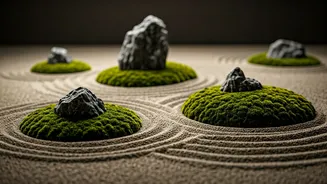Embrace Ikigai
Ikigai, often translated as "a reason for being," is a core Japanese concept that encourages individuals to identify their purpose in life. It emphasizes
finding the intersection between what you love, what you are good at, what the world needs, and what you can be paid for. This technique is not about achieving one grand goal, but rather, about finding joy and fulfillment in everyday activities. To practice Ikigai, begin by reflecting on your passions, skills, values, and contributions. Consider how you can align these elements to create a sense of purpose and direction. Regularly engaging in activities that bring you joy and align with your Ikigai can lead to a more meaningful and satisfying life. This could be anything from gardening or helping others, to pursuing a career that aligns with your passions. The key is to find activities that make you feel alive and contribute to your overall well-being. By focusing on your Ikigai, you cultivate a sense of direction and purpose, leading to greater resilience and a more positive outlook on life.
Practice Shinrin-Yoku
Shinrin-Yoku, or "forest bathing," involves immersing oneself in the atmosphere of the forest to promote relaxation and well-being. This practice is more than just taking a walk in the woods; it is about engaging all your senses to connect with nature. To practice Shinrin-Yoku, find a natural environment, such as a forest or park, and take your time. Begin by consciously slowing down and observing your surroundings: the rustling of leaves, the scent of the trees, the sunlight filtering through the canopy. Breathe deeply, allowing the forest air to fill your lungs. Studies have shown that forest bathing can reduce stress hormones, lower blood pressure, and boost the immune system. The benefits stem from the phytoncides released by trees, which have natural healing properties. During your forest bath, engage your senses: touch the bark of a tree, listen to the birds, and feel the earth beneath your feet. Allow yourself to be present in the moment and let go of any worries or distractions. Incorporating Shinrin-Yoku into your routine, even for short periods, can provide significant benefits for your mental and physical health.
Master Kaizen Principles
Kaizen, meaning "continuous improvement," is a Japanese philosophy that encourages making small, incremental changes to achieve larger goals. The core idea is that consistent, gradual improvements are more sustainable and effective than drastic overhauls. This approach can be applied to various aspects of life, from personal habits to professional endeavors. To implement Kaizen, start by identifying a specific area you want to improve. Break down the goal into small, manageable steps. Focus on making one small change at a time, celebrating each milestone achieved. This incremental approach reduces overwhelm and makes it easier to stay motivated. For example, if your goal is to exercise regularly, you might start with a 10-minute walk each day and gradually increase the duration or intensity. The key is to be consistent and patient. Kaizen also encourages reflection and learning from each small improvement. Evaluate what worked, what didn't, and what you can do better next time. By embracing the principles of Kaizen, you foster a mindset of continuous growth and development, leading to positive transformations over time.
Cultivate Wabi-Sabi
Wabi-Sabi is a Japanese aesthetic that embraces imperfection and impermanence. It celebrates the beauty found in simplicity, asymmetry, and the natural process of aging. This philosophy encourages us to accept the imperfections of life and find beauty in the transient nature of things. To practice Wabi-Sabi, begin by shifting your perspective. Instead of seeking perfection, appreciate the unique qualities of things, even if they are flawed. This can apply to objects, relationships, or your own self-perception. In your home, for example, choose items that are handmade or show signs of wear and tear, rather than mass-produced, perfect objects. Embrace the beauty of natural materials, such as wood, stone, and clay. In your relationships, accept that people are imperfect, and find beauty in their flaws. Wabi-Sabi encourages mindfulness and presence. By slowing down and appreciating the present moment, you can find joy in the simplicity and imperfections of life. This can lead to greater contentment and a sense of peace.
Find Zen Through Mindfulness
Mindfulness, a practice rooted in Zen Buddhism, involves paying attention to the present moment without judgment. This technique helps to reduce stress, improve focus, and enhance overall well-being. To cultivate mindfulness, begin by practicing meditation. Even a few minutes of daily meditation can have a profound impact. Sit comfortably, close your eyes, and focus on your breath. When your mind wanders, gently guide your attention back to your breath without judgment. You can also practice mindfulness in your daily activities. For example, when eating, focus on the taste, texture, and aroma of your food. When walking, pay attention to the sensation of your feet on the ground and the movement of your body. The key is to be present in the moment and observe your thoughts and feelings without getting carried away by them. Practicing mindfulness can lead to greater self-awareness, emotional regulation, and a sense of inner peace. Regular practice can help you develop a calmer and more focused mind, enhancing your ability to cope with stress and navigate the challenges of life with greater ease and resilience.






















